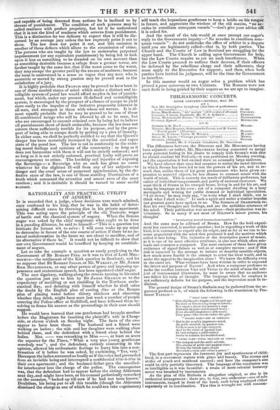RATIONALITY AND PRACTICAL UTILITY OF AUGURY.
IT is recorded that a judge, whose decisions were much admired, once confessed to his king, that he was in the habit of deter- mining difficult cases by throwing dice in his private apartment. This was acting upon the principle of the old Teutonic wager of battle and the classical system of augury. When the Roman augur was asked by the chief magistrate what ought to be done in a puzzling dilemma, he said to himself—" This is a question too intricate for human wit to solve : I will even make up my mind to determine in favour of the one course of action if there be no in- ternal maleformation in the brute we are about to sacrifice, and of its alternative if there be." It would not be difficult to show that our own Government would be benefited by keeping an establish- ment of augurs.
Let us take for example a question as sorely perplexing to the Government of Sir ROBERT PEEL as it was to that of Lord MEL- BOURNE—the settlement of the Kirk question in Scotland ; and let us suppose that Sir ROBERT INGLIS, or Mr. WAKLEY, Or Mr. JAMES Suat. BUCKINGHAM, or any other person of grave and imposing ap- pearance and sententious speech, has been appointed chief augur. The new dignitary, walking along the streets turning in his mind the question just put to him by Sir JAMES GRAHAM as to the expediency of meddling or not meddling in the Northern eccle- siastical fray, and debating with himself whether be shall solve the doubt by the English plan of casting dice or the Roman plan of placing water before thirsty chickens and observing whether they drink, might have seen last week a number of people entering the Police-office at Guildhall, and have followed them re- solving to frame his answer as the proceedings in their case should suggest.
He would have learned that one gentleman had brought another before the Magistrate for insulting the plaintiff's wife in Cheap- aide, at eleven o'clock on Sunday night. The facts of the case appear to have been these. The husband and a friend were walking on before ; the wife and her daughter were walking close behind them, and the defendant with a friend close behind the ladies. Mrs. — was remarking to Miss —, at least so avers the reporter for the Times, " What a very nice young gentleman somebody was"; and the defendant, entirely concurring in the opinion, allowed his enthusiastic feelings to hurry him into a con- firmation of it before he was asked, by exclaiming, "Yes, very." Hereupon the ladies screamed as loudly as if the voice had proceeded from an invisible being and interrupted a confidential tete-A-tete in their own apartment ; and the husband-father gave the uncalled- for interlocutor into the charge of the police. The consequence was, that the defendant had to appear before the sitting Alderman next day, and might have been, as his counsel pathetically remarked on the occasion, "locked up till now if he bad not been known." Doubtless, his being put to all this trouble (though the Alderman dismissed the charge as one of which he could not take cognizance) will teach the loquacious gentleman to keep a bridle on his tongue in future, and appreciate the wisdom of the old maxim, "ne ac- cedes in consilium antequam vocaris "—don't give your advice till it is asked for.
And the moral of the tale would at once prompt our augur's reply to the Government inquiry—" Ne accedes in consilium ante- quam vocaris " : do not undertake the office of arbiter in a dispute until you are legitimately called—that is, by both parties. The Church and the Courts of Law in Scotland are struggling for the upper band. The Church is calling upon Government for help, but the Law Courts. require as yet no such interference. When the Law Courts proceed to enforce their decrees, if their officers be deforced by the rebellious clergy and their adherents, they must apply to the Executive for support ; and then, when both parties have invited its judgment, will be the time for Government to interfere.
In this manner would an augur solve a problem which has proved a pons asinorum to two Cabinets. The Romans were not such fools in being guided by their augurs as we are apt to imagine.


























 Previous page
Previous page